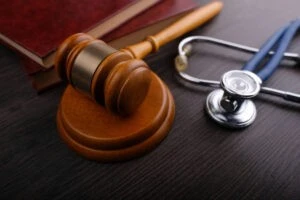
Many personal injury cases are resolved with a settlement after depositions when the representatives for each side weigh the testimony and evidence. A post-deposition settlement will rarely be immediate since the negotiation will take time. Fortunately, you do not have to go through this complex process alone or feel intimidated by a huge insurance company or its adjuster.
What happens after a deposition could lead your personal injury case to settle without going to trial. A dedicated New York personal injury lawyer will provide you with strong advocacy through every step of the settlement negotiations. You can get the legal service and support you need at no upfront cost, and your lawyer will only be compensated if and when you recover damages.
- What Happens During a Personal Injury Deposition
- Depositions Often Lead Your Case Toward Settlement Negotiations
- Financial Compensation Your Lawyer Will Request With a Personal Injury Claim
- Get Legal Guidance for Depositions in Personal Injury Cases
What Happens During a Personal Injury Deposition
Depositions are taken in personal injury cases, including motor vehicle accidents, dog bite cases, and slip and fall accidents. During the deposition, you will be asked various questions about the accident and your post-accident life. A court reporter will be present to record testimony and anything you and others say will potentially be used as evidence in your case.
- During mediation or arbitration
- During the negotiation process
- At trial, if your case goes to court
Representatives for both sides will receive written transcripts of the testimony for their records. Your personal injury attorney will review it for accuracy and submit it as part of your case record.
Questions You Should Expect to Be Asked if You Are Deposed
A deposition is a legal proceeding that produces sworn testimony. A person who gives testimony at a deposition is subject to all the obligations that a witness has when testifying in court. You will be under oath and must give truthful answers. You should expect to be asked about:
- Your background
- The accident
- Your injuries
- Your recovery
- Your income
- Evidence
If a lawyer represents you, they will accompany you to the deposition, intervene on certain questions, and make objections when warranted. They will also prepare you and any supporting witnesses beforehand.
Your Personal Injury Case Could Require Multiple Depositions
The deposition you sit for is unlikely to be the only one involved in your case. Your lawyer and the at-fault party’s lawyers could also choose to depose:
- The plaintiff (you)
- The Defendant (the at-fault party)
- Eyewitnesses to the accident
Each side is entitled to depose anyone who could provide beneficial information that supports their client’s version of events. You do not have to attend every deposition. Your legal team will provide you with regular updates as your case develops and progresses.
For a free legal consultation, call 516-932-0400
Depositions Often Lead Your Case Toward Settlement Negotiations
The next step of your case after deposition is not automatically settlement. Each side could request additional information, and receiving an initial settlement offer could take time. The sooner you consult a personal injury lawyer, the more time they have to investigate, collect evidence, and strengthen your case.
Even if your legal team makes a settlement demand, it will take time to receive a response. Negotiations involve offers, counteroffers, and other factors that affect the timeline of your case.
How a Personal Injury Lawyer Manages the Negotiation Phase
While you are not required to hire a lawyer to negotiate a settlement, doing so could benefit your settlement efforts in the following ways:
- Protect you from a speedy but “lowball” settlement offer
- Protect you from bad faith insurance tactics
- Fight for the maximum value of your case
- Weigh the pros and cons of each offer you receive
- Guide you toward a well-informed final decision
Your lawyer will handle all the back-and-forth steps of negotiation. They will also clarify the insurer’s obligation to investigate and act on your claim promptly, including disbursing funds once a settlement is reached.
Discovery Will Also Steer Your Case Toward an Out-of-Court Settlement
Simply put, discovery is the exchange of information between both parties and their representatives. Each party is entitled to all the facts of the case. The evidence obtained in discovery, combined with the information learned in deposition, could lead to a settlement.
The information exchange will include:
- Lists of relevant documents
- Names and contact details
- Complete insurance policies
- Detailed list of your damages
Financial Compensation Your Lawyer Will Request With a Personal Injury Claim
The damages you can request compensate you for your potential out-of-pocket costs and many non-financial damages. Recoverable compensatory damages include the following types of damages:
- Medical and rehab bills
- Loss of income
- Lost earning potential
- Property damage or loss
- Diminished property value
- Disability and disfigurement
- Physical pain and suffering
- Mental and emotional distress
- Impaired quality of life
- Wrongful death damages, if applicable
An essential part of recovering damages for an injury is recovering the right amount of damages. Your attorney will work hard to document your case and avoid having it undervalued or underpaid.
File Your Lawsuit on Time Even if Your Case is Headed for Settlement
You have a limited time to file a civil lawsuit in New York. The personal injury statute of limitations is found in New York Civil Practice Laws & Rules § 214. The wrongful death statute of limitations is found in Estates, Powers & Trusts § 5-4.1.
If your lawsuit is not filed on time, it will negatively impact your legal rights. Your lawyer can explain how the statute of limitations will affect your case. With the right information as to deadlines and options for taking legal action, you will be able to make decisions that best serve your interests.
Click to contact our personal injury lawyers today
Get Legal Guidance for Depositions in Personal Injury Cases
The deposition phase of a personal injury case allows both sides to question witnesses about the accident. In most cases after a deposition, a personal injury case will head toward negotiation and settlement.
Find out how we guide you and any witnesses to prepare for the deposition process and its aftermath. Contact our team at Friedman & Simon, L.L.P. to get started today.
Call or text 516-932-0400 or complete a Free Case Evaluation form
